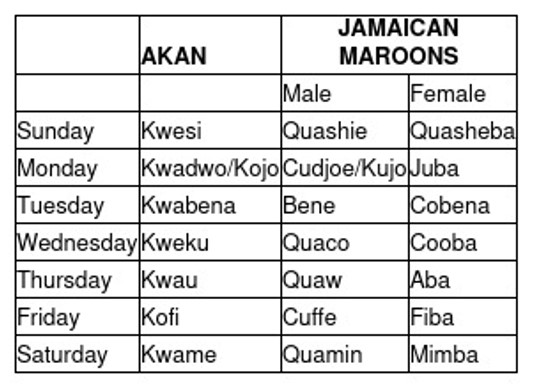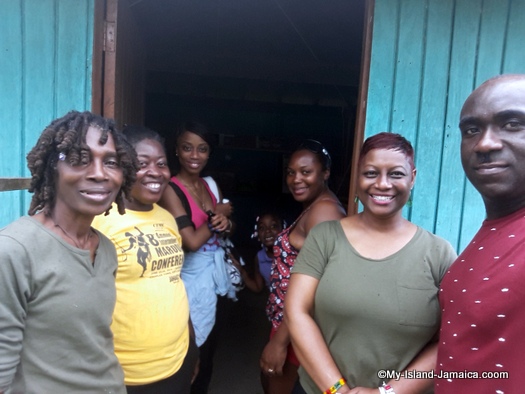Subscribe for all my updates and don't miss a thing! Sign me up!
What Part Of Africa Are
Most Jamaicans From?
Sharing Is Caring! Share this awesome content with your friends now.
by Venesha Johnson | Associate Writer
Afro-Jamaicans are those persons in Jamaica whose ethnic background is primarily from Sub-Saharan Africa. They are the majority ethnic group in the nation. The majority of Jamaicans are of mixed ancestry and can trace their ancestry back to African, European and Asian countries however, they identify themselves as Jamaican.
New! Take a piece of Jamaica with you💃!
Savour the memories! Now you can get your authentic Jamaican souvenir items, as well as traditional Jamaican herbs, spices and housewares on our popular e-store. Click Here to learn more.
And, if you ever need a trustworthy and knowledgeable local guide, consider booking a private tour with us!
Enslaved Africans were brought to Jamaica and other parts of the Americas during the Atlantic slave trade in the 16th century, which is where the ethnogenesis of the Black Jamaican people began.
The first set of Africans arrived in 1513 but by 1655, after participating in a war against their Spanish masters alongside English invaders, many were able to escape and become free. They subsequently retreated to the mountains, where they resisted the English colonial government for decades and earned the name "Maroons."
Most Jamaican slaves came from the region of modern-day Ghana, Nigeria and Central Africa, and included the Akan, Ashanti, Yoruba, Igbo and Ibibio, Kongo, Yoruba and Fon peoples. The Igbo influence, however, is barely noticeable in Jamaica.
Nothing that would indicate an Igbo cultural hegemony can be found, except for a few terms and perhaps the fondness for thick soup as opposed to a light soup like the Akan people. But the Akan culture dominates every other African influence on Jamaican culture. The Akan people made up the majority of the Maroons.
The Akan people were also referred to as Koromanti by Jamaican planters. The Koromantis were the most obstinate and also the most revered people during the early years of British colonization. Due to the conflicts and warfare they experienced in Africa, many of them had prior military experience.
Akan People’s influence in Jamaica today:
Language- this is usually a major aspect of linking cultural origins. While the Akan people did indeed influence the Jamaican language, specifically the Jamaican Patois, it is much more difficult to pinpoint specific words because the Jamaican patois is a conglomeration of English, Spanish and languages of the many different African tribes that came to Jamaica.
Name giving- Today's Maroons and even slave descendants use various names that originate in Africa, frequently from specific parts of Africa. The West African practice of "day names" is one of the most identifiable African naming patterns in both North America and the Caribbean.
This indicates that a specific name was given to each day, and babies were given names based on the day of the week they were born. The majority of Maroons and other African residents of Jamaica had Akan day names. For instance, an infant born on Sunday was given the names Kwesi in Ghana and Quashie in Jamaica.
 “Dr. Edmund Abaka from the University of Miami and the book Language in Exile, Barbara Lalla & Jean D’Costa provided the names shown.”-
“Dr. Edmund Abaka from the University of Miami and the book Language in Exile, Barbara Lalla & Jean D’Costa provided the names shown.”-Music and Instruments- Richard Rath describes how English surgeon Hans Sloane of the Royal Society realised that the music played and instruments used by the slaves of Jamaica were comparable to the sounds of African music in his article "African Music in 17th Century Jamaica."
He discovered that the music and instruments during a festival hosted by the slaves "sounded" like African music and were strange to the Europeans. He created a drawing of the instruments they were using and discovered that they were built in the same way as Africans used. The central African lute and the eight-stringed harp, a Koromanti instrument, were both among them.
In the Gold Coast, instruments were frequently wound with fibre. The Koromanti and Jamaican dancing styles were quite similar, as were the movements used in the dances.
Obeah- The Akan and Jamaicans shared a practice known as Obeah, a form of witchcraft, in common usage today. The Jamaican Maroons like all African peoples thought that elders were wizards or "Obeah-men."
These highly intelligent Obeahmen would do strange feats using rare medicines and drugs. For instance, they would give someone medication to slow down their pulse rate, making everyone think they were dead, and then the Obeah-man would pretend to raise the "corpse" from the dead.
This is one of the reasons the Koromanti, one of Jamaica's most treasured groups of slaves, were the ancestors of the Maroons, the most autonomous and rebellious group of black people in the country. To convince others—including planters—that they were powerful, they utilised Obeah.
It is safe to say that most Jamaican ancestry is linked to the people of Ghana, particularly the Igbo and Akan people. However, because the Akan people were true warriors, had high resilience and were combative, aspects of their legacy are more noticeable in Jamaica today.
Sharing IS Caring! Please help me get the message out by sharing this article with your friends on social media (links below). Thnx ;-)
If you found this page useful, please consider subscribing to my weekly newsletter, to get even more.
It tells you each week about the new information that I have added, including new developments and great stories from lovers of Jamaica!
Return to Is Jamaica In Africa? from What Part of Africa Are Most Jamaicans From
Return to My Island Jamaica Homepage from What Part of Africa Are Most Jamaicans From?
References & Sources For What Part Of Africa Are Most Jamaicans From
- (no date) The maroons. Available at: https://scholar.library.miami.edu/slaves/Maroons/individual_essays/leanna.html (Accessed: November 26, 2022).
- Afro-Jamaicans (2022) Wikipedia. Wikimedia Foundation. Available at: https://en.wikipedia.org/wiki/Afro-Jamaicans (Accessed: November 26, 2022).
- Earle, C.P. (no date) Jamaican embassy. Available at: https://www.embassyofjamaica.org/about_jamaica/history.htm#:~:text=Most%20Jamaican%20slaves%20came%20from,Yoruba%2C%20Ibo%20and%20Ibibio%20peoples (Accessed: November 26, 2022).
What Part Of Africa Are Most Jamaicans From? | Written: November 26, 2022
New! Get My Latest Book👇🏿
|
You asked, I've answered! You no longer need to save for months or years, to enjoy paradise! I spilled the beans! sharing my top tips on finding cozy accommodations and secret gems, only the way a native could! Click Here to pick it up on my e-store and start saving now! |
See The Best Of Jamaica - In Videos!
|
My channel reaches over 140,000 subscribers worldwide and has leveraged over 11 million views, sharing, what I call 'The Real Jamaica'. Subscribe today and join our family of viewers. |
Read More ...
New! Experience The REAL Jamaica!
Book Your Private Tour here and experience Jamaica the way we (locals) do!
P.S. Didn't find what you were looking for?
Still need help?
Click Here to try our dependable and effective Site Search tool. It works!
Or, simply click here and here, to browse my library of over 500 questions and answers! Chances are someone already asked (and got an answer to) your question.









New! Comments
Have your say about what you just read! Leave me a comment in the box below.